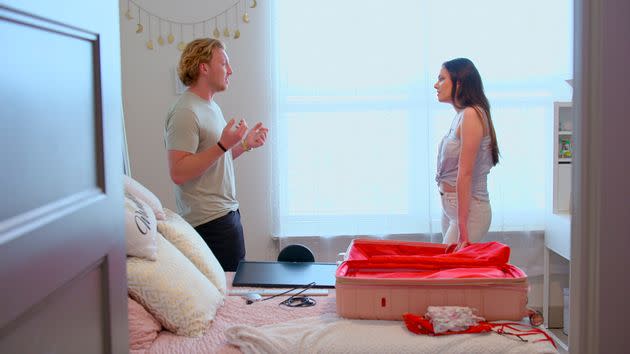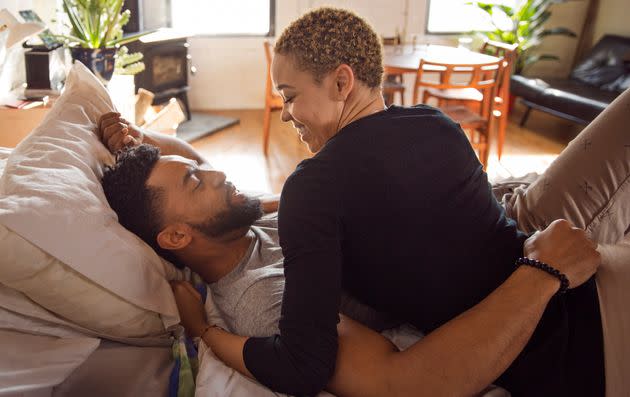Here’s 1 Sex Lesson Everyone Could Stand To Learn From 'Love Is Blind'

If there’s one thing this season of Netflix’s dating show “Love Is Blind” has taught us, it’s that conversations about birth control methods can be complicated and too often misconstrued (that, and to be careful about who you claim as your celebrity look-alike on national television.)
On the sixth season of the popular reality show, couple Johnny McIntyre and Amy Cortés, both 28, gently butt heads over what kind of contraceptives they should use to avoid having kids for the time being: Johnny specifically is “terrified” that one mistake would lead to a “Johnny Jr.” because raising a child is expensive and they’re not at that point in their relationship.
Johnny, clearly a product of our nation’s spotty-at-best sex education programs, figures Amy is already on hormonal birth control, like every other woman he’s been with.
“I always thought that, like, everyone was on birth control. 100%. Like, I was so ignorant on that,” he tells fellow cast member Laura Dadisman, noting that all the women he’s talked to have complained about being on it.
After the string of episodes aired, Amy went on Instagram to clear a few things up: She said that she never felt pressured by Johnny to use birth control and that in an unaired segment of the show, she explained to him she has “a rare genetic hereditary disorder that affects the blood vessels in [her] body,” which affects her desire to have children.
She was also concerned about how her body would react to hormonal birth control. (Though the pill is generally safe, everybody is different, and some people on oral contraceptives experience mood swings, headaches, nausea, low libido and blood clots.)
“Johnny’s fear about the whole kids situation is the biggest roadblock to intimacy,” Amy says in a later confessional interview. “I feel like Johnny’s really scared.”
“We have to, like, research and kind of figure out a solution pretty soon before the wedding,” she says.

Amy brings up the subject of a vasectomy for Johnny on the show, which he’s open to, but in a post-show interview with People, Johnny revealed that he would eventually like to have children with Amy. That could pose a problem if he goes ahead with a vasectomy; doctors generally caution against the procedure if you’re considering “undoing it” later. Though vasectomies can can be reversed, the procedure is costly and the chances for a successful reversal decrease each year.
This raises the question: Why didn’t the couple discuss condoms, a method of birth control that is 98% effective when used properly? In the aforementioned Instagram post, Amy said the couple did indeed talk about condoms, but it was cut from the show.
For sex educators and sex therapists watching “Love Is Blind,” the show’s segue into birth control ethics felt perfectly timed. In the wake of the Supreme Court’s June 2022 reversal of Roe v. Wade, which had generally protected abortion rights, conversations about family planning and preventive options have never been more vital.
“It’s great that this is in mainstream media and that we’re talking about this because I think, unfortunately, a lot of people don’t understand birth control and pregnancy and how all of this stuff can work,” said Keeley Rankin, a sex and relationship coach in San Francisco. Rankin gave the show props for discussing abortion in an earlier season, too.
“In this case [with Amy and Johnny], I’m not really surprised that a man who’s 28 thinks every woman is on birth control,” she said. “I mean, I’d like to say I’m surprised but I’m not, given the state of sex ed in this country.”
Nationwide, just 29 states and the District of Columbia require public school students to receive any form of sex education, and only 18 require such teaching to be medically accurate.

Not talking about it can lead to unwanted pregnancies and people going ahead with sex they’re ill at ease about.
“I’m shocked on a daily basis at how few of the couples I treat understand contraceptive health, let alone talk about it comfortably,” said Kimberly Resnick Anderson, a certified sex therapist and assistant professor of psychiatry at the UCLA School of Medicine. (She’s also the host of the “Sex Savvy” podcast.)
“Many of my female patients have reported feeling pressure to allow partners to go ‘bareback’ without a condom at some time in their past,” she said. “When they tell me it’s awkward to say no or bring up the topic, I tell them if they can’t have a conversation about sex, they shouldn’t be having sex,” Resnick Anderson said.
It’s equally important to discuss sexually transmitted infections and STI testing with any new partners, Rankin said. It’s alarming that cases of syphilis ― an STI that was close to being eradicated in the U.S. in the 1990s ― have risen to their highest levels since the 1950s, according to a new report from the Centers for Disease Control and Prevention.
“I know these aren’t sexy conversations to have, but you have to have them,” Rankin said. “With conversations about contraceptives, I tell clients you can be, like: Here’s what I’m on. Here’s what I’m doing. Here’s my opinion on abortion. What about you, and how do you feel?”

Your decision on birth control methods is yours and yours alone.
It should go without saying that contraception is a highly personal choice and every person has autonomy in deciding what to do with their body.
“Even if Amy didn’t have a genetic condition, the choice to use hormonal birth control is hers and only hers, of course,” said Heather McPherson, a marriage and family therapist and certified sex therapist in Austin, Texas.
For Johnny, any choice about something as potentially inconvertible as a vasectomy is firmly his to make as well.
That’s why Resnick Anderson thought Amy jumping to proposing a vasectomy was a bit drastic.
“Getting a vasectomy knowing you will just reverse it later feels somewhat similar to taking Plan B repeatedly after unprotected sex. All surgeries have some degree of risk and is not something to ever take lightly,” she said.
When it comes to sexual and reproductive health, being proactive is always better than being reactive, she added.
Ideally, both partners feel comfortable sharing their contraception preferences openly in a safe environment and not in the heat of the moment, McPherson said. These kinds of Big Relationship Talks deserve time and a clear, non-thirsty mind.
“Sometimes individual preferences or needs regarding birth control don’t match up. That can be a difficult reality to face but an important one to understand early on in a relationship,” she said. “Communicating about birth control requires patience and acceptance of the answers, even when it means intercourse is off the table.”
If you talk about it right before sex and are at odds, it may mean wearing a condom or having non-penetrative sex.
“A condom may not be the most pleasurable, but there are ways around this,” McPherson said. “With a little imagination and playfulness, putting on a condom can be fun and sexy at times.”
Remember, the juice is always worth the squeeze, McPherson said. (Choice idiom for this story, we must say.)
“Although talking about pregnancy prevention and STI prevention may be difficult, these conversations will prevent an array of even more challenging situations and conversations down the road,” she said.
